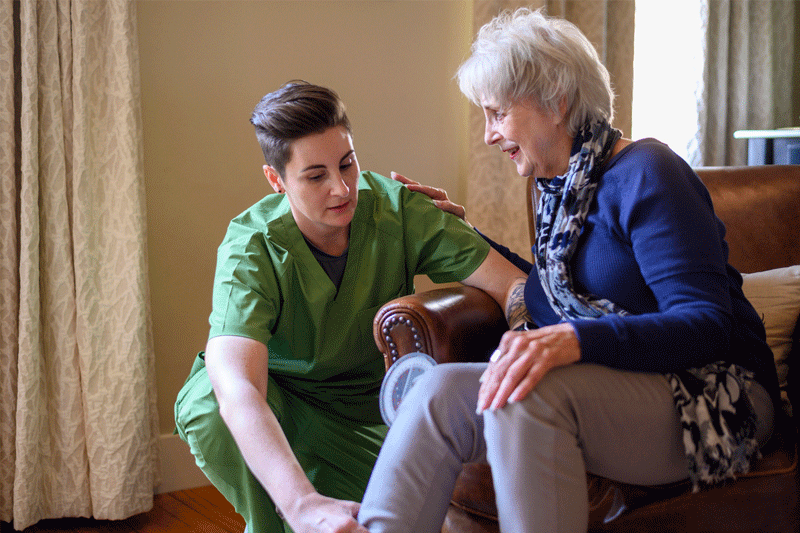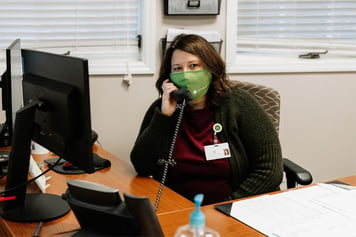If you or your loved one are considering hospice care, there are a number of reasons that make this a good choice. Hospice can help those near the end of life experience greater quality of life, better symptom control and pain management. It can provide families with the opportunity to make the most of their time together.
Hospice has many benefits for patients and their families. You’ll want to evaluate your options to ensure that:
- Your loved one receives the best care.
- All who are involved have the best experience during a challenging time.
If you or your loved one are nearing the end of life and considering hospice, we hope the following considerations will help.
Choose the right hospice care
Many people believe that hospice is about going to a facility for care, but this isn’t necessarily true. Hospice is a unique philosophy of care that focuses on enhancing the quality of life during the final stages of life. Wherever your loved one lives — a private residence, assisted living community or nursing home — a hospice care team brings clinical, compassionate services.
As you consider your options, get answers to the following questions:
Where will hospice care take place?
When a patient lives in a private residence, your care team will come to your loved one’s home to provide pain management, symptom control and personal care. Your care team will also provide education and emotional and spiritual support to you and other caregivers.
Although the majority of hospice care takes place in a private residence, if symptoms become too difficult to manage at home, the patient can be transferred to a hospital, long-term care facility or inpatient hospice unit to continue the plan of care.
Once the pain and symptoms are managed, you or your loved one will be brought back home to continue receiving routine home care.
All Medicare-certified agencies provide four levels of hospice care based on the needs of the patient and caregiver.
Is the organization accredited and Medicare-certified?
Make sure your hospice provider is accredited, meaning they have met and maintained certain quality standards established by a national association.
You’ll also want to make sure that they are Medicare-certified, meaning they are able to bill Medicare for services.
What are the experiences of current patients?
You can learn a lot about the quality of hospice care by hearing the stories of patients and their families.
Another way to learn about patient experiences is through the U.S. Centers for Medicare & Medicaid Services, an organization that measures and reports on the experiences of people receiving home health and hospice care. Choosing a hospice care agency with strong scores for communication, safety and other measures helps ensure your loved one will have a positive experience.
Are you able to speak with a representative?
Sometimes, speaking directly with a representative of the organization is the easiest way to learn more about their services. If you’re seeking inpatient treatment, take a tour of the facility, which will give you the opportunity to ask current patients and caregivers questions.
Make decisions with your care network
Making decisions around your hospice options should include input from your care network, which includes family members and medical providers. As you have conversations on the topic, make sure any conflicts of opinion are discussed before the decision is made to avoid issues in the future.
It’s not uncommon for hesitancy to come up when discussing hospice care. Usually, these opinions are expressed due to misconceptions about hospice, such as:
- Hospice is for people giving up. In reality, hospice care is about helping people live the best life possible with the time they have left.
- Inpatient hospice is permanent. People can return to their homes if their pain and other symptoms are managed.
- Hospice is only for people with a few days or weeks to live. In fact, while hospice is for the terminally ill, that means the patient's physician has certified that they have six months or less to live - not necessarily only weeks or days. The full benefits of hospice occur when pain and symptoms are managed, allowing patients to make time for personal and spiritual connections.
Make sure that all involved understand their role in providing care for your loved one. Hospice will provide a support team, but family members, friends or others in your personal network are responsible for coordinating who cares for your loved one.
It’s challenging for one person to be the full-time caregiver, so make sure the entire care network agrees about the choice of hospice.
Understand your loved one’s wishes
Having conversations with your loved one about their wishes at the end of life can be incredibly difficult. Working together or separately, have your loved one write down their wishes for what is most important to them at end of life. Help them complete a living will like Five Wishes to offer directions for family, friends and medical care to follow in the event they are no longer able ot make decisions. The wishes should include personal, emotional and spiritual wishes as well, such as how they wish to be treated and what they would like their loved ones to know.
Take the Amedisys hospice quiz
As you and your loved one consider hospice, it might be helpful to compare their experiences to a questionnaire to receive a more solid answer.
Hospice is about promoting a greater quality of life through symptom control and pain management so you and your loved one can make the most of the time you have left together.
Take the Amedisys hospice quiz to find out if it’s the right answer for you.





